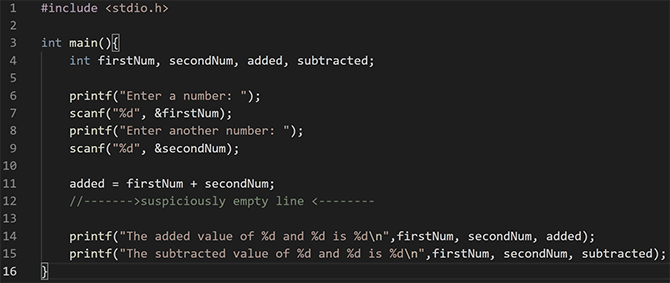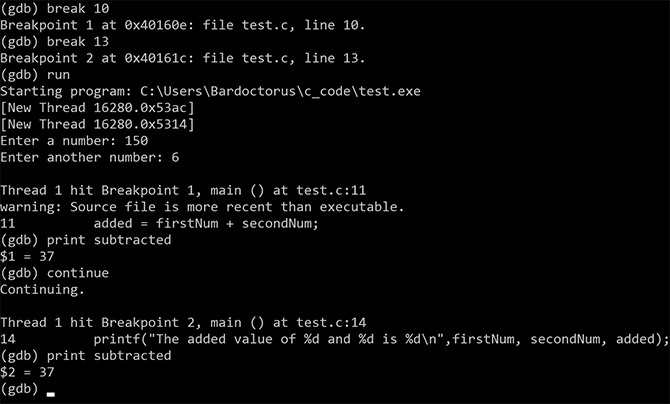C Cool Easy Things to Do in C
If you've heard of programming, you've heard of C. It's one of the oldest coding languages around. Some fear it, and others love it.
C has a reputation for being hard for beginners. There are many good reasons to learn the language, but there are a few essential tips to bear in mind while starting out.
What Is the C Programming Language?
To understand what the C programming language is, it is worth learning what coding is before continuing!
C is a low-level procedural programming language. C is much closer to the actual machine code your computer runs on. This makes it incredibly fast, but challenging to use, and capable of breaking your system if you are not careful!
Why Learn to Program in C?
If C is so complicated and dangerous, why learn it?
Well, C is everywhere.
- Almost every computer operating system is written in C.
- Most smartphones and tablets have a C based operating system.
- Almost every microcontroller, whether it runs the display on your microwave door or the internal telemetry in a car, is programmed in C.
- C++, Objective C, and C# all are built directly on top of C, and Python was written in it.
- A good knowledge of C looks great on any programmer's resume.
Some people think learning C before any other programming language results in a better understanding of programming as a whole.
Learning C is also learning about how your computer works. C programmers can have a deeper understanding of the way code affects systems, and find learning other programming languages easier as a result.
1. Learn the Basic Variable Types
Data comes in different types. It is important to know what type of data you are working with, as they can be easy to confuse. An example is knowing that the number 5 can be an integer (as in the number 5), as well as a character (the written character 5).
int number = 5; Now there is no confusion, the variable number is assigned the integer value 5. C needs to be told what types to expect in order to work the way you want it to.
Data types and how they are assigned to variables is an essential part of your C course, and it's important to understand.
Knowing how to give data the correct type is an important skill in all programming, but it is essential in C.
2. Learn the Operators
If C is the first language you are learning, you will likely be learning operators for the first time. Operators are symbols that tell the compiler to carry out a task. Perhaps the simplest example is the + operator.
answer = number + anotherNumber; No prizes for guessing that this code adds together two integer variables. Not all operators are this simple though.
C uses many operators for arithmetic, assignment, and logic among others. Knowing what each of these operators do will help you pick up core programming concepts quicker.
3. Use the Standard Libraries
C may be low level, but it does have a set of libraries to help with creating programs. Mathematical operations, locale-specific data (like currency symbols), and various variable types and macros are all defined in libraries.
You can use these libraries by including them into your code. Take this example:
#include <stdio.h>
int main ()
{
printf("Hello, World!");
return 0;
}
In C, the simple act of outputting to the console requires the inclusion of the stdio.h (standard input/output) header file.
There are 15 standard libraries for programming in C, and following a guide to what they all do will help you with your learning.
4. C Is Unforgiving
C will do precisely what you tell it, and instead of complaining when something doesn't make sense it will still try to keep working. This can not only break your program but cause problems to your entire system!
While this sounds dramatic, it usually isn't. You aren't going to break your computer. You might end up with some weird bugs though. Take this example:

This piece of code prints questions to the console, before scanning what the user inputs and storing them as integers. The program is designed to add them together and subtract them before printing the answers back to the user.
You might already see that there is a problem here. The output certainly makes no sense!

Since we never actually subtract the values, the subtracted variable has a nonsense value given to it on initialization. Other programming languages might warn you that you never gave the subtracted variable a value. Not C.
This example is easy to debug visually, but some code is thousands of lines long and incredibly complex, and C won't help you find what is wrong. Instead, C gives you a stupid answer and no way to find out why. Or is there?
5. Debugging Is Your Best Friend
Since C code can contain unwanted behavior, it can cause errors which are difficult to track down, with no apparent reason. To stop yourself from completely losing your mind you should get comfortable with debugging your code.
A debugger like GDB can help with this. Here, GDB is running on the faulty script from above.

Usually, a program runs until it finishes, or it crashes. Debuggers allow you to break down your code line by line. Here, break points are set up at lines 10 and 13 where we suspect the issue could be.
Then, the program is run as normal. The numbers are entered, then the program pauses after line 10. The debugger is asked to print the value of subtracted, which shows as a value of 37. This makes sense, we haven't told subtracted a value yet, so it has a random value.
Then, the debugger continues. We repeat the process after line 13, and print subtracted only to find out that the value hasn't changed.

It turns out we forgot to do the calculation at all, instead opting to leave a suspiciously empty line of code. Thank you debugging!
GDB is a C coder's best friend, and the earlier you learn to use it, the happier you will be!
What You C Is What You Get
The C language is a life long learning experience, and there are things we haven't even touched on in this article like pointers and memory allocation.
While C has got a tough reputation you can learn by doing, so get hands-on and start with your own C programming beginner project.
Image Credit: sjenner13/Depositphotos
richardsongolould.blogspot.com
Source: https://www.makeuseof.com/tag/c-programming-tips-to-get-started/
0 Response to "C Cool Easy Things to Do in C"
Publicar un comentario